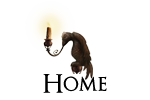Scribble City Central's penultimate and forty-first Fantabulous Friday comes from Zoë Marriott. You may not have come across Zoë's novels yet, in which case you are in for a real reading treat. Shadows on the Moon is a truly original YA fantasy about shadow weaver Suzume, set in a 'secondary world' Japan, and her latest, Frostfire, made me stay up all night to finish it. The other two - The Swan Kingdom and Daughter of the Flames - are equally page-turning high fantasy. I promise you, she's a talent to watch, and, my instinct tells me, about to become the Next Really Big Thing in YA publishing.
I don't say this lightly. I read a lot of YA. Some of it is very good, some of it is 'meh', some of it is average. Rarely is it truly excellent. Zoë's work definitely comes under the latter category, and I'm pleased to say that I have an SCC EXCLUSIVE to share with you!
Scribble City Central has been extremely privileged to be the VERY FIRST to read a copy of Zoë's newest novel, The Night Itself, the first in The Name of the Blade trilogy. I've sworn on pain of instant excommunication not to put up any spoilers, but I can tell you that this is the most unusual take on urban fantasy I've read in years. It's fresh, it's original, it has a cool factor of sub-zero and it's going to take the teen reading world by storm. If I'm wrong, I swear I'll eat a hat with a knife and fork in public. Here's the little I can tell you about the plot: Mio wants a realistic weapon to wear with her Rukia anime costume to a fancy dress party - so she 'borrows' the Yamato family heirloom from the attic. The katana is an ancient sword, and by unsheathing it from its hiding place, she lets loose a terrifying evil from the past, which stalks the streets of London, killing at random. Pursued by gods and monsters from Japanese myth, Mio must learn to use the sword's mystical powers or suffer the consequences - and after the intriguingly honourable young warrior Shinobu enters her life, she learns that failure to do so might just break her heart.
I absolutely loved the way Zoë melds the life of a London teenage girl with aspects of Japanese culture - anime and manga fans will love the Kitsune fox clan - and makes it into such a smooth and credible whole. Mio and her goth best friend Jack play off each other in a way which makes them really jump off the page, coming across to the reader as likeable, rounded and fully-formed characters - and Mio in particular has an overt bravery about her which I found extremely refreshing. Too many heroines in YA come across as tentative, unsure of themselves and just a bit inadequate in their own eyes. Mio is definitely not one of those 'always-questioning-herself' heroines – she's kickass and New Feminist, but portrayed in a sympathetic way that shows her as not 'Miss Perfect', and it makes me love her all the more to know that she does have some very human teengirl quirks and frailties.
I cared about what happened to every single one of the main protagonists - and my desire to know What Happens Next is Very Enormous. I also loved the spark of curiosity Zoë lit in me with regard to Japanese myth. It's not something I know a great deal about - but I'm going to investigate. One story she refers to in the book (and I don't think she'll mind me mentioning this) is of the gods Izanagi and Izanami. I was surprised at how many parallels there were with the mythical Greek stories of Ouranos and Gaia, and also of Persephone, Orpheus and Eurydice. Entirely fascinating for a myth geek such as myself.
Although The Night Itself isn't coming from Walker Books till July 2013, I'd urge you to put it on your wishlist right now. Until then, and to give you an insight into some of the mythical characters in the book, here's Zoë to tell you about:
Y for Yokai
Mischievous Japanese Tricksters
ZM: The Yokai is a more or less unknown quantity for many people in the West. He or she – or even it – originates in Japan, a culture which, due to its many years of Isolationism, is still fascinatingly new and alien to most other cultures.
Yokai do not take any one form. In fact, they’re a whole class of mythical beings ranging from benevolent spirits who help humans, to mischievous trickster figures, to downright malevolent creatures who murder anyone that might cross their path. The word simply means ‘phantom’ or ‘apparition’.
But don’t run away with the idea that Yokai are ghosts! Although some of them are created from humans who have gone through extreme suffering, such as the Yuki-Onna, a female snow spirit thought to appear when a woman dies of exposure, others are embodiments of nature, like the Oni, a kind of ogre-ish creature tied to a certain geographical feature in the landscape, such as a mountain. Some Yokai are ‘spirit animals’ or ‘obake’ - normal cats, badgers, raccoons or snakes who undergo a magical transformation or simply live to such a great age that they gain the ability to shapeshift. There is a whole subclass of Yokai called Tsukumogami: everyday items like paper lanterns, tea kettles or even straw sandals which come to life when they reach a hundred years old!
The thing each Yokai has in common is the possession of a spirit or a soul of its own. These are not mindless creatures. Their actions, powers and habits may seem incomprehensible to humans, but there is usually a detailed back-story to their existence, and they are all very much alive, even when someone or something has had to die to call them into existence.
 |
| A selection of Japanese Yokai |
In many ways, the teeming diversity of Yokai is the Japanese counterpart of the broad category of Western ‘fairies’, which includes selkies, brownies, elves, weres, haunts, gnomes, glims and the Sidhe or Fair Folk. But most of us have seen a dozen different incarnations of a werewolf, fairy or elf in books, on TV, and in the cinema. Few of us have even heard of the majority of Yokai. There’s a truly magical sense of the unknown about them, and a lot of space for writers and readers to exercise their imagination!
I think my fascination with Yokai dates back to a story I read in a Reader’s Digest anthology of fairytales and folklore when I was about ten. There were many Western stories in the book, but it also included the tale of a Kitsune – an immortal fox spirit – who fell in love with a mortal man, and eventually turned to a pillar of stone in her heartbreak when he chose a human wife over her. Such a melancholy story was unusual in a book of stories for children, and it appealed to me greatly.
Yokai came into my own work in quite a surprising way – not as part of the setting in one of my high or secondary world fantasies, but as the inspiration for my very first urban fantasy, and my first trilogy. I’d always wanted to write a fantasy set in this world. After the great explosion in young adult paranormal romance and urban fantasy over the past couple of years, a lot of urban-fantasy-ish ideas were starting to develop in the back of my head; tropes that I was interested in subverting, characters that I wanted to turn on their heads, plots that I wanted to explore. But I needed a mythology, and by that point I was sick of vampires, elves, werewolves, fairies, angels and every other staple of the genre.
Then one day a friend of mine quoted the Robert Graves poem ‘The Bedpost’ to me. It’s about a legendary warrior who is trapped in the form of a wooden post until a pitying maiden should set him free. In the poem the maiden in question isn’t interested and the warrior remains trapped. Instantly I felt the need to write a different, more satisfying ending to this story. But my warrior wouldn’t be trapped in a bed post. He’d be imprisoned somewhere a bit more interesting… like in a sword. A Japanese katana, in fact. And my mythology would be the folklore of Japan, and my creatures – my heroine’s enemies and allies – would be the fascinating Yokai.
In writing about many different kinds of Yokai for The Night Itself – Book One of The Name of the Blade trilogy - I’ve tried to honour the spirit of their intricate origin stories, and the fact that each of them has complex motives and agendas. But because these creatures are roaming the streets of 21st century Britain, it also felt right to give them a little twist.
 |
| A Kitsune Fox spirit |
One of my favourite Yokai is still the Kitsune. It seemed logical that London, a city which is known for its urban fox population, would have a distinct clan of urban Kitsune all its own. These foxes are as cunning and clever as their Japanese cousins, but they’re a lot less friendly to the humans who poison and shoot them than the Kitsune of folklore. They dress in the latest fashions and venture out to watch movies or shop, but they can still turn into foxes at will and shoot lightning from their tails when provoked. And their lack of concrete gender – the myths say that they can take any kind of human form they wish, whether it’s as a beautiful young woman or an ancient old man – would give even modern day teenagers pause.
You can find Yokai in all their forms roaming through Hayao Miyazaki’s astonishing animated films. If you want more detailed information, a copy of The Great Yokai Encyclopedia by Richard Freeman will show you how neatly and precisely the Japanese categorize these seemingly chaotic creatures.
SCC: Thank you so much, Zoë. I do love the fact that TNI was sparked off by a Robert Graves poem - I think the old master of mythology would love that. The Yokai are fascinating, and I look forward to finding out more about them, as I'm sure do many of my readers.
Next Week: Caroline Lawrence, author of The Roman Mysteries, explores Z for Zephyros in the last of the series



















3 comments:
Oh I could have done with a Kitsune fox this afternoon - no,on second thoughts he is too magnificent to use in the way I would like to have used one!
Fascinating - I know almost nothing about Japanese folk lore.
Now I want to know what you were going to do with it, Cat! Thanks for commenting - much appreciated.
What a fantastic post! I've been a fan of Zoe's books since The Swan Kingdom (and you're right, her writing is truly excellent) and the more I hear about The Name of the Blade series the more excited I get. I'm typically not a fan of UF, but this concept just sounds so darn awesome. And I LOVE Japanese mythology and culture. It's so mysterious and complicated and ancient and beautiful. So excited for these books to start releasing! Thanks to both of you!
Post a Comment